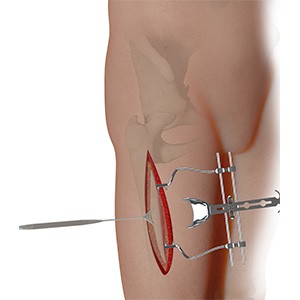- Anatomy
- Conditions
- Procedures
VELYS Hip Navigation

Total hip replacement, also called total hip arthroplasty, is a surgical procedure in which the worn out or damaged surfaces of the hip joint (cartilage and bone) are removed and replaced with an artificial prosthesis (implant) to prevent painful bone-on-bone contact, relieve pain, and restore normal range of motion and hip function.
Mako Robotic-Arm Assisted Technology for Total Hip Replacement

Mako Robotic-Arm Assisted Total Hip replacement is a surgical procedure intended for patients who suffer from non-inflammatory or inflammatory degenerative joint disease (DJD). Some forms of DJD include osteoarthritis (OA), post-traumatic arthritis, rheumatoid arthritis (RA), avascular necrosis (AVN) and hip dysplasia.
Minimally Invasive Total Hip Replacement

Minimally invasive total hip replacement is a surgical procedure performed through one or two small incisions rather than the single long incision of 10–12-inches as in the traditional approach.
Anterior Hip Replacement

Anterior hip replacement is a minimally invasive hip surgery to replace the hip joint without cutting through any muscles or tendons as against traditional hip replacement that involves cutting major muscles to access the hip joint.
Outpatient Hip Replacement

Hip replacement surgery is one of the most common orthopaedic surgeries performed. It involves the replacement of the damaged hip bone (ball shaped upper end of the femur) with a ceramic ball attached to a metal stem that is fixed into the femur and placing a new cup with a special liner in the pelvis. Traditionally, the surgery was performed with a large, open incision and required the patient to stay in the hospital for several days. With advanced techniques, it is now possible to perform these surgeries on an outpatient basis where the patient is up and walking a few hours after surgery and goes home on the same day.
Total Hip Replacement

Total hip replacement is a surgical procedure in which the damaged cartilage and bone are removed from the hip joint and replaced with artificial components. The main indication for total hip replacement is arthritis.
Revision Hip Replacement

During total hip replacement, the damaged cartilage and bone are removed from the hip joint and replaced with artificial components. At times, hip replacement implants can wear out for various reasons and may need to be replaced with the help of a surgical procedure known as revision hip replacement surgery.
Revision Hip Surgery

Revision hip surgery is a repeat hip surgery performed in certain patients to correct the problems or complications of previous hip surgery and overcome its limitations.
Complex Hip Reconstruction Surgery

Complex hip reconstruction surgery is a surgical procedure employed to treat hip structures with complex hip fractures or traumatic hip injuries, deformities, structural issues, and damage from diseases such as arthritis. The main objective of complex hip reconstruction surgery is to alleviate hip pain and stiffness, improve range of motion, and restore normal functioning of the hip joint to help you resume your normal activities and improve your quality of life.
Hip Surgery

Hip surgery is a surgical procedure for the treatment of a hip injury or hip condition. The procedure involves repairing diseased or damaged structures of the hip joint in order to eliminate pain and restore normal hip function.
Hip Fracture Surgery

Hip Fracture Surgery is a Surgical correction of a hip fracture is known as hip fracture surgery.
Complex Primary Hip Replacement

Primary hip replacement or hip arthroplasty is a surgical procedure in which the worn out or damaged parts of the hip joint are removed and replaced with artificial components called prostheses or implants that are made of metal, plastic, or ceramic.
Hip Resurfacing

The hip joint is also known as a ball and socket joint, where the ball (femoral head) of the thigh bone fits into the socket (acetabulum) of the pelvic bone.
Hip Preservation Surgery

The hip is a ball and socket joint comprising of the femur (thigh bone) and the pelvic bone. The head of the femur (ball) articulates with a cavity (socket) called the acetabulum in the pelvic bone. To facilitate the smooth and frictionless movement of the hip joint, the articulating surfaces of the femur head and acetabulum are covered by spongy articular cartilage. Injury, wear-and-tear and certain diseases can result in the wearing away of the cartilage tissue, causing painful rubbing of bones.







